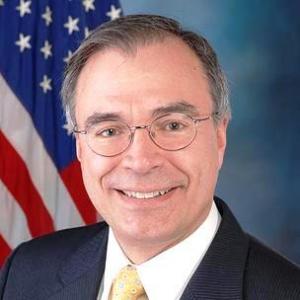Passage of the omnibus spending bill was good news and bad news for marijuana reform advocates. A big win for medical marijuana, but a nasty move to block voter-approved legalization in DC, too.
The president has commuted the sentences of eight drug offenders and issued pardons for four more who have already done their time.
Despite the confusion, leading Democrats involved in negotiations over DC marijuana reforms in the "CRomnibus" budget bill say that Initiative 71 still lives.
Big news out of Washington and, for a change, most of our medical marijuana news is out of the Midwest this week.
An Indianapolis man being pursued by the DEA and local cops crashed his vehicle, then killed himself. That's the year's 38th drug war death.
The beat goes on. A Texas drug dog officer snorts the training dope, a pair of married Indiana deputies get wrapped up in the new synthetics, and a Georgia judge goes down for trying to set up a woman who accused him of making advances on her.
There are conflicting views on the fate of DC's legalization initiative, the Justice Department okays marijuana growing on Indian reservations, Spaniards now support marijuana legalization, and more.
The president weighs in on congressional moves to block DC marijuana legalization, Oklahoma could be joining the cannabis oil medical marijuana club, a Wisconsin woman sues over the "cocaine moms" law, the ACLU is looking to sue a Connecticut housing agency over mandatory drug tests, and more.
Texas begins heading down the path of marijuana reform, a Missouri legalization initiative seeks to really free the weed, Rep. Andy Harris isn't very welcome in DC these days, Kentucky tries to deal with heroin again this year, and more.
The Monitoring the Future teen drug use survey is out, the "cromnibus" bill also killed highway drug use surveys, Rep. Steve Cohen (D-TN) wants better information on police killings, a damning report is released in Mexico, and more.
It's the 100th anniversary of the Harrison Narcotics Tax Act, a GOP senator chides Obama for "pro-marijuana" messages, human rights groups urge the UNODC to quit funding Iranian drug enforcement because of its resort to the death penalty, and more.
[This article was written in partnership with Alternet, and was originally published here.]
With final approval by the Senate Saturday night, the Congress has successfully approved a massive, $1.1 trillion dollar omnibus spending bill, and the president has signaled he will sign it. The bill includes two provisions that illustrate Congress's currently schizophrenic approach to loosening marijuana laws.
On the one hand, the bill contains an amendment that will effectively end federal interference in states where medical marijuana is legal by barring the Justice Department from using its funds to go after patients and providers there. On the other hand, it also contains a rider that seeks to undo the will of the voters of the nation's capital by blocking the District of Columbia from enacting the recently approved Measure 71 marijuana possession and cultivation legalization initiative.Sponsored by Reps. Dana Rohrabacher (R-CA), Sam Farr (D-CA), and 10 others, the medical marijuana amendment is blunt. After listing all the medical marijuana states, it says: "None of the funds made available in this Act to the Department of Justice may be used… to prevent such States from implementing their own State laws that authorize the use, distribution, possession, or cultivation of medical marijuana." (The bill also includes similar language barring the use of Justice Department funds to interfere with hemp research authorized under the already approved Agricultural Act of 2014.)
The amendment is also important. In the past three years alone, the Justice Department has threatened elected officials, dispensary operators, and their landlords with legal action over medical marijuana. Those threats have delayed or stopped implementation of medical marijuana laws in at least six states. Similarly, threats of criminal prosecution and/or asset forfeiture aimed at landlords in California and Colorado have resulted in the closure of at least 600 state law-abiding medical marijuana businesses.
And DEA teams have aggressively raided and US Attorneys have prosecuted medical marijuana patients and providers. One stark example is the case of the Kettle Falls Five, a family of patients who were growing medical marijuana for their own personal use in accordance with Washington state law. In a state where marijuana is legal, federal prosecutors are seeking to send a pair of elderly patients and their children to prison. That prosecution is now in doubt.
"This is truly a long-fought victory for medical marijuana patients who have lived in fear of being caught in the crossfire of conflicting state and federal laws for nearly two decades," said Steph Sherer, executive director of Americans for Safe Access (ASA), which has lobbied for years for passage of the measure. "But this is also a victory for taxpayers because of the hundreds of millions of dollars saved on unnecessary and harmful enforcement."
Last year, ASA issued a report showing the Obama administration had spent $80 million a year on medical marijuana enforcement. That may be chump change in a trillion-dollar spending bill, but it's still $80 million that could be better used each year.
"Congress has finally initiated a drawdown in the federal government's war on medical marijuana," said Mason Tvert, director of communications for the Marijuana Policy Project (MPP). "This legislation makes it clear that the DEA has no business interfering in states' medical marijuana laws. Taxpayer money should not be used to punish seriously ill people who use medical marijuana and the caregivers who provide it to them."
"For the first time, Congress is letting states set their own medical marijuana and hemp policies, a huge step forward for sensible drug policy," said Bill Piper, director of national affairs for the Drug Policy Alliance (DPA). "States will continue to reform their marijuana laws and Congress will be forced to accommodate them. It's not a question of if, but when, federal marijuana prohibition will be repealed."
But if federal marijuana prohibition will someday be repealed, no one has told congressional Republicans, and congressional Democrats didn't seem to care much, either. The second part of Congress's schizoid pot policy two-step was a slap in the face to both marijuana legalization and the will of the voters of the District of Columbia.
Maryland Rep. Andy Harris (R) authored a rider to the bill that says that the District cannot "enact or carry out any law, rule, or regulation to legalize or otherwise reduce penalties associated with the possession, use, or distribution of any schedule I substance under the Controlled Substances Act (21 U.S.C. 801 et seq.) or any tetrahydrocannabinols derivative."
Republican House committee heads got it inserted into the House version of the bill, and Senate Democrats didn't consider it important enough to fight to remove.
Marijuana reform proponents (and believers in democratic rule for the residents of DC) were livid, and they are not ready to roll over in the face of congressional attempts to quash legalization in the District.
"In light of recent events in Ferguson and New York, it would be particularly disturbing if Congress has chosen to overturn the will of the voters in a majority black city," said Dr. Malik Burnett, DPA policy manager and vice-chair of the DC Cannabis Coalition, the group that got Measure 71 passed. "DC voters chose to reform their marijuana laws, which have a direct impact on how communities of color interact with police. Congress should not undermine that."

Rep. Andy Harris (R-MD), author of the rider to block DC marijuana legalization. (house.gov)
The District city council has been advancing a bill that would tax and regulate marijuana sales, but the Harris rider effectively kills that. Less certain, however, is whether it can really block Measure 71 from taking effect.
House Minority Leader Nancy Pelosi; Rep. Eleanor Holmes Horton, the Congressional Delegate from DC.; Rep. Jose Serrano (D-NY), the ranking member on the House appropriations subcommittee that funds DC; Rep. Nita Lowey (D-NY), the ranking Democrat on the House Appropriations Committee; and others have said that the DC rider allows Initiative 71 to stand. The DC government is blocked from enacting any new marijuana law reforms but it is free to implement and carry out reforms that have already been enacted.
The congressional Republicans who pushed the measure naturally disagree. They argue that Measure 71 has not been enacted because the DC council has not yet sent it to Congress and that the rider thus blocks it from being implemented.
While the question is likely to end up being settled in the courts, the next move is up to the District city council. It can go ahead and send the measure to Congress despite what the budget bill rider says. Advocates are urging the council to do just that.
And the council seems to be in a mood to stick up for the initiative -- and for democratic rights for the District. DC Council Chair Phil Mendelson told The Washington Post even before the final Senate vote that he plans to ignore the rider. He said he will instead follow normal procedure for voter-approved initiatives in a city that exists under the congressional thumb. He will sent a bill implementing the initiative to Congress next month for a 30-day review in which lawmakers can vote it up or down.
And if that doesn't work, there's still the courts.
"If the question is whether I'd be open to legal action, the answer is yes," Mendelson told Politico after the House vote.
Whether Congress has successfully blocked marijuana legalization in DC clearly remains to be seen. What is not in dispute, though, is that Congress has taken a major step toward clearing the way for medical marijuana, and that's a big deal.
back to top
President Barack Obama today commuted the prison sentences of eight drug offenders and issued pardons for 12 other people who had already finished their sentences. The commutations were for people imprisoned for crack cocaine and methamphetamine offenses.

President Obama exercises his clemency powers. (whitehouse.gov)
No one is walking out of prison today, but all eight had their sentences reduced to lengths that will allow them to walk out at some point in the next year.
Among those who got commutations is Sidney Earl Johnson of Mobile, Alabama, who has been serving a life sentence for crack cocaine offenses since 1994. Another is Larry Naylor of Memphis, who has been serving a life sentence for 50 grams of crack since 1997.
Obama pardoned another 12 people who had already served their time for offenses -- sometimes decades in the past. Four of those pardoned were also drug offenders.
Obama had not been particularly prolific with his exercise of the commutation power -- he had only commuted 10 sentences in his first six years in office -- but earlier this year, the administration announced new, more expansive clemency guidelinesb in a bid to decrease the number of people imprisoned under draconian drug war statutes.
At the time, the White House said the new rules could result in "hundreds, perhaps thousands" of people being granted clemency. This is a start.
See the complete list of pardons and commutations here.
back to top
Despite the language Republicans managed to include in the "CRomnibus" federal spending bill interfering with the District of Columbia's right to set its own marijuana policies, several leading Democrats say that the Initiative 71 marijuana possession and cultivation legalization initiative is still alive.
A close reading of the relevant language in the bill shows that while it would block the District council from enacting a pending bill to tax and regulate marijuana, it would not undo DC's decriminalization law that is already on the books. The language around Initiative 71 is less clear, but Democrats involved with the negotiations say it is clear that the legislative intent of the rider in question was to allow both decriminalization and Initiative 71 to stand.House Minority Leader Nancy Pelosi; Rep. Eleanor Holmes Horton, the Congressional Delegate from DC.; Rep. Jose Serrano (D-NY), the ranking member on the House appropriations subcommittee that funds DC; Rep. Nita Lowey (D-NY), the ranking Democrat on the House Appropriations Committee; and others have said that the DC rider allows Initiative 71 to stand. The DC government is blocked from enacting any new marijuana law reforms but it is free to implement and carry out reforms that have already been enacted.
"Initiative 71 was enacted on November 4th when 70% of DC voters approved it, said Bill Piper, director of national affairs for the Drug Policy Alliance. "Voters wanted to reduce racial disparities in the criminal justice system and focus police resources on serious and violent crime. The will of the people should stand. While Initiative 71 won't take effect until after the Council transmits it to Congress in January and it goes through an administrative 30-day review period, it has very clearly already been enacted by the voters."
The Drug Policy Alliance is urging the DC city council to transmit Initiative 71 to Congress as soon as it convenes in January.
back to top
Big news out of Washington and, for a change, most of our medical marijuana news is out of the Midwest this week. Let's get to it:
NationalLast Saturday, the Senate passed the omnibus spending bill with an amendment blocking federal medical marijuana enforcement. The amendment that will effectively end for now Justice Department interference in states where medical marijuana is legal by barring the department from using its funds to go after patients and providers there.
Indiana
On Wednesday, a lawmaker said she would introduce a medical marijuana bill. Sen. Karen Tallian (D-Portage) said she plans to introduce a medical marijuana bill in the upcoming legislative session. She cited Congress's vote to bar the use of Justice Department funds to go after medical marijuana in states where it is legal. In previous sessions, Tallian has introduced pot decriminalization bills, but those have gone nowhere.
Iowa
On Tuesday,a group of Iowans orgnized to push for a more effective medical marijuana law. The legislature this year passed a bill allowing for the use of low-THC cannabis oil to treat people with epilepsy, but that's not good enough for a new group, Iowans 4 Medical Cannabis. The group today announced it had formed to push legislators to make it possible to produce and dispense medical marijuana.
Oklahoma
Last Friday, a cannabis oil medical marijuana bill was filed. Rep. John Echols (R-Oklahoma City) has said he planned to file a low-THC cannabis oil bill. The bill would only allow for use my children suffering from epilepsy. The news comes as the director of the state's drug agency says he now backs a study that would make the medicine available to sick children.
[For extensive information about the medical marijuana debate, presented in a neutral format, visit MedicalMarijuana.ProCon.org.]
back to top
An Indiana man being pursued by the DEA and local police led law enforcement on a high-speed chase before crashing and then shooting himself Tuesday. Omar Eduardo Proano-Montano, 24, becomes the 38th person to die in US domestic drug law enforcement operations so far this year.
According to The Indianapolis Star, citing law enforcement sources, Indianapolis police and DEA agents doing a drug investigation attempted to conduct a traffic stop on Proano-Montano, but he fled, leading police on a high-speed chase.The chase ended when Proano-Montano crashed into a tree. After a short standoff, police heard a gunshot from within the cab of Proano-Montano's vehicle. They found him dead from a self-inflicted wound.
After Proano-Montano's death, agents executed a series of searches and traffic stops at locations linked to him and found cash, guns, and drugs. In his truck, they found nine pounds of crystal meth and three pounds of cocaine. At other locations, they also seized $9,000 in cash, five fully loaded military grade semi-automatic rifles with 1,000-plus rounds of ammunition, one shotgun, eight handguns, a ballistic vest and a Cadillac, police said.
back to top
The beat goes on. A Texas drug dog officer snorts the training dope, a pair of married Indiana deputies get wrapped up in the new synthetics, and a Georgia judge goes down for trying to set up a woman who accused him of making advances on her. Let's get to it:
In Grapevine, Texas,
a Grapevine Police K-9 officer was arrested last Monday for allegedly stealing a case of training drugs and consuming some of them. Senior Officer Danny
Macchio, 49, reported to Fort Worth police in October that someone had broken into his vehicle at his residence and stolen the drugs, which included, heroin, cocaine, meth, and ecstasy, but Grapevine police developed suspicions he had "mishandled" the drugs and the theft report.
Macchio fled on the day he was supposed to undergo a drug test as part of the investigation, but was found in the Panhandle and returned home by Grapevine police. He confessed that he had taken the drugs and used some, and he returned the rest He was suspended with pay on October 24. Now he is charged with abuse of official capacity -- misuse of government property, a state jail felony.
In Indianapolis, two former Hendricks County sheriff's deputies were arrested last Thursday on charges related to a synthetic drugs sales ring. Jason Woods, 44, and Teresa Woods, 34, had been suspended from the sheriff's office in October 2013 after a marked sheriff's vehicle linked to them had been spotted at locations under investigation. That same day, the couple dropped off a safe with Teresa Woods' mother -- who promptly contacted authorities. They searched it, finding $88,000 and 100 grams of synthetic drugs. Investigators also found evidence the couple had written checks to a Canadian company that sells synthetic drug powders. Although state police said it was one of the biggest synthetic drug operations in the state, the couple have so far been charged only with misdemeanor possession of synthetic drugs.
In Atlanta, a former chief judge of the Murray County Magistrate's Court was found guilty last Thursday of conspiring to plant meth on a woman who had publicly accused him of making advances on her in his chambers. Former Judge Bryant Cochran plotted with a Murray County sheriff's deputy and a local meth offender to plant the drug in her vehicle, then have her pulled over and arrested. He was convicted in federal court of witness tampering, conspiring to distribute a controlled substance and a federal civil rights charge that accused him of sexually assaulting a court employee. He faces a February 20 sentencing date.
back to top
There are conflicting views on the fate of DC's legalization initiative, the Justice Department okays marijuana growing on Indian reservations, Spaniards now support marijuana legalization, and more. Let's get to it:

A New Mexico Indian reservation. There could be a new cash crop coming. (wikipedia.org)
DC Legalization Still Alive? Republicans Just Say No. While Democrats argue that marijuana legalization was "enacted" by the voters on November 4 and thus will prevail, Republicans beg to differ. They argue that because the initiative has not been transmitted to Congress or passed congressional review, it has not been enacted. "It's pretty clear," said Rep. Andy Harris (R-MD) who led the charge against decriminalizing pot in DC with a rider that was not included in the final bill. "You can't enact anything once the rider's passed. The legalization is not enacted." We probably haven't heard the final word on this just yet.
Justice Department Okays Indian Tribes Growing, Selling Marijuana. In new guidance to US Attorneys, the Justice Department is telling them not to prevent tribes from growing or selling marijuana on tribal lands, even in states that have not legalized it. It is unclear how many tribes will take up the offer; while some see pot sales as a source of potential revenue, others are strongly opposed to the use or sale of marijuana on their lands. The Justice Department will generally not attempt to enforce federal marijuana laws on tribes that choose to allow it, as long as they meet eight federal guidelines, including that marijuana not be sold to minors and not be transported to areas that prohibit it.
Drug Testing
Michigan Welfare Drug Testing Bill Heads to Governor's Desk. A two-bill package that would impose suspicion-based drug testing on some welfare recipients has passed the legislature and now awaits the signature of Gov. Rick Snyder (R). The bills would create a pilot drug testing program to begin by next October. Under the bills, welfare applicants would be screened, and if the screening suggests "reasonable suspicion" they are using drugs, a drug test would be required. Although Republican sponsors said they were concerned about children, Republicans defeated a move to allow an appointed adult to receive funds for children if their parents are disqualified because of drug use.
International
Poll Finds a Majority of Spaniards Say Legalize Weed. Some 52% of Spaniards are ready to legalize marijuana, according to a new poll from the Foundation for Aid Against Drug Addiction. That's well above previous surveys from the same group conducted in 1999 and 2004. "There has been a development around the image of this drug, which could have contributed to an increase of a more cannabis-friendly population," the foundation noted.
back to top
The president weighs in on congressional moves to block DC marijuana legalization, Oklahoma could be joining the cannabis oil medical marijuana club, a Wisconsin woman sues over the "cocaine moms" law, the ACLU is looking to sue a Connecticut housing agency over mandatory drug tests, and more. Let's get to it:

Indonesian police will begin enforcing the ban on magic mushrooms next month. (wikipedia.org)
Obama Thinks Congress Should Not Interfere With DC Pot Laws. As the battle continues over whether Congress has managed or not to block the District of Columbia's Measure 71 legalization initiative, President Obama has weighed in. In a Thursday press conference, White House press secretary Josh Earnest said the president did "not believe Congress should spend a lot of time interfering with the citizens of District of Columbia." Asked specifically about Measure 71, Earnest noted that the measure had been approved by the voters and that, "on principle," that Congress shouldn't interfere with home rule. But Earnest also noted that Obama supports passing the omnibus spending bill that would, some say, overturn the measure.
Medical Marijuana
Cannabis Oil Bill Should Be Filed Today in Oklahoma. Rep. John Echols (R-Oklahoma City) has said he plans to file a low-THC cannabis oil bill today. The bill would only allow for use my children suffering from epilepsy. The news comes as the director of the state's drug agency says he now backs a study that would make the medicine available to sick children.
Drug Testing
Connecticut Public Housing Agency Under Fire for Suspicionless Drug Testing of Applicants. The Norwalk Housing Authority (NHA) requires mandatory, suspicionless drug testing of people applying to live there, and the ACLU of Connecticut is looking for people who want to sue the agency over the issue. "We urge you to repeal this policy because this suspicionless drug testing violates guarantees in the United States and Connecticut constitutions against unreasonable searches and seizures," wrote ACLU staff attorney David McGuire in a December 2013 letter to the Authority. "We would like to hear from any potential tenant who objects to the suspicionless drug test so that we can consider legal action," McGuire said Wednesday. To make matters worse, the NHA is the only housing authority in the country to drug test using hair follicles, which unlike urine or blood samples, can reveal drug use going back weeks or even months.
Law Enforcement
Georgia Judge Convicted of Planting Drugs on Woman. A woman accused a judge of propositioning her when she appeared before him to seek warrants against people who had assaulted her, so he conspired with some local cops to plant methamphetamine in her vehicle and have her arrested. Now, former Magistrate Court Judge Bryant Cochran has been found guilty of conspiracy to distribute a controlled substance, violating the civil rights of a court employee by sexually assaulting her, and witness tampering. He's looking at almost certain federal prison time when he is sentenced in February.
Pregnancy
Lawsuit Will Challenge Wisconsin's "Cocaine Mom" Law. A woman who was jailed after admitting past drug use while seeking a pregnancy test and medical help for depression is filing suit to have the state's "cocaine mom" law thrown out. That law allows authorities to detain and force treatment on pregnant women suspected of drug or alcohol use. Tammy Loertscher of Medford is filing the suit with the assistance of National Advocates for Pregnant Women, which says the Wisconsin "fetal protection" law is one of the most sweeping in the nation.
International
Hungary's Prime Minister Wants Drug Tests for Journalists and Politicians. Hungary's rightist prime minister, Viktor Orban, who has vowed to make the country a "non-liberal" state, called today for mandatory drug testing for journalists and politicians. "The government decided that it will rid Hungary of the drug mafia in this term," Orban said. "Politicians, journalists and those filling positions of public trust have to be included (in the drug tests) because it is clear that those who consume drugs cannot be relied on in the fight against drugs." Orban's statement isn't sitting well with journalists and civil libertarians, with the Association of Independent Journalists calling his proposal "legally and morally deeply outrageous." Earlier this week, the mayor Budapest calling for drug testing teens as well, but that proposal appears have been dropped.
Just a Reminder: Magic Mushrooms Are Now Illegal in Indonesia.Magic mushrooms had long been excluded from Indonesian drug laws, and were openly sold and used, especially in the popular tourist destination of Bali, but that's no longer the case. They are now considered a Type 1 narcotic since the law was revised earlier this year, and police are on a campaign to let people know. "All people who consume and trade in magic mushrooms are violating the Narcotics Law," Denpasar Police drug section head Comr. I Gede Ganefo said recently. "Many people do not yet know that magic mushrooms are illegal and they could face a prison term if they sell or consume them. They think it is all right as they grow naturally in manure," Ganefo said. Police said the informational campaign will become an enforcement campaign starting January 1. "Next month [Jan. 2015], there will be no more tolerance. If we find any people selling or consuming magic mushrooms, we will arrest them. They could face the same charges as those using marijuana and other drugs, a minimum four-year and maximum 12-year prison term," Ganefo said.
back to top
Texas begins heading down the path of marijuana reform, a Missouri legalization initiative seeks to really free the weed, Rep. Andy Harris isn't very welcome in DC these days, Kentucky tries to deal with heroin again this year, and more. Let's get to it:

The Kentucky legislature will try to deal with heroin again this year. The bill has good and bad elements. (wikimedia.org)
Texas Bill to Reduce Pot Penalties Filed. State Rep. Joe Moody (D-El Paso) today introduced a bill that would remove the threat of arrest, jail, and a criminal record for small-time marijuana possession. The measure is House Bill 507. "Our current marijuana policy in Texas just isn't working," Rep. Moody said at an Austin press conference. "We need a new approach that allows us to more effectively utilize our limited criminal justice resources. This legislation is a much-needed step in the right direction." The legislation is being backed by Texans for Responsible Marijuana Policy, a coalition that includes the Marijuana Policy Project, the ACLU of Texas, and Republicans Against Marijuana Prohibition.
Another, Looser Missouri Legalization Initiative Effort is Underway. Show Me Cannabis has some competition. The marijuana reform group has a legalization initiative pending, but now, there's another, less restrictive initiative also in the works. A team from KC NORML last week submitted a petition to put its own measure on the ballot. The Missouri Cannabis Restoration and Protection Act would remove marijuana from the state's list of controlled substances, free anyone imprisoned for marijuana-only convictions, bar police from charging drivers with DUI if the only drug they test positive for is marijuana, and put no limitation on the number of plants people can grow. Once approved by state officials, the initiative will need 160,000 valid voter signatures -- 8% of registered voters in at least six of the state's eight legislative districts -- to qualify for the ballot.
DC Businesses Tell Maryland Congressman Who Tried to Block Legalization to Stay Away. Rep. Andy Harris (R-MD) is not very welcome in the District these days. He has been the primary mover behind Republican efforts to block voter-approved legalization in DC. While his rider blocking legalization was included in the recent omnibus spending bill, whether it will actually stop DC legalization remains to be seen. Now, there is a Blacklist Andy Harris movement, and at least one business, has put up a sign displaying his face along with prominent text reading "Not Welcome."
Heroin
Kentucky Omnibus Heroin Bill Increases Sentences, Has Harm Reduction Provisions. Senate Budget Committee Chairman Chris McDaniel has pre-filed a bill, Senate Bill 29, that attempts a broad response to the state's issues with heroin. The bill would allow for increased access to the overdose reversal drug naloxone, create a 911 Good Samaritan provision to try to reduce overdose deaths, and fund drug treatment. It would also increase sentences for some heroin dealing offenses. A similar bill failed to get through the legislature last year.
International
Uruguay Sees First Marijuana Expo. Uruguay is the first country to legalize marijuana commerce, and now it's had its first marijuana trade show. Expocannabis opened in Montevideo over the weekend.
back to top
The Monitoring the Future teen drug use survey is out, the "CRomnibus" bill also killed highway drug use surveys, Rep. Steve Cohen (D-TN) wants better information on police killings, a damning report is released in Mexico, and more. Let's get to it:

If Walid Jumblatt has his way, this Lebanese hash field could be legal. (cannabisculture.com)
Drug Use Survey Finds Teen Marijuana Use Declining Even as States Legalize. The annual Monitoring the Future survey of teen habits is out today, and it finds that legalization has not sparked an increase in teen pot smoking. The survey found that 24% of eighth, 10th, and 12th graders reported past use marijuana last, down from 26% the year before. And among 12th graders, the number who reported daily use also declined from 6.5% last year to 5.8% this year. There's much more to the survey; click the survey link to see it.
Medical Marijuana
Iowans Organize to Push for More Effective Medical Marijuana Law. The legislature this year passed a bill allowing for the use of low-THC cannabis oil to treat people with epilepsy, but that's not good enough for a new group, Iowans 4 Medical Cannabis. The group today announced it had formed to push legislators to make it possible to produce and dispense medical marijuana.
Driving
Omnibus Spending Bill Cut Funds for NHTSA Roadside Drug Use Surveys. The $1.1 trillion spending bill that has gotten so much attention over its marijuana provisions also bars the National Highway Traffic Safety Administration (NHTSA) from using funds to complete its "National Roadside Survey." It was a voluntary survey that only collected data from people willing to participate, but came under congressional criticism after a Texas TV station aired a program about a Fort Worth checkpoint where police ordered motorists off the road at random to collect samples.
Law Enforcement
Federal Bill Filed to Increase Reporting of Deadly Force by Police. Rep. Steve Cohen (D-TN) has filed HR 5866, which would "require the Attorney General to issue rules pertaining to the collection and compilation of data on the use of deadly force by law enforcement officers." The bill next was not available at press time. The bill has five cosponsors -- all Democrats -- and has been referred to the House Judiciary Committee.
Drug Testing
WorkForce West Virginia Drug Testing Doesn't Find Many Dopers. In its annual report to the legislature, WorkForce West Virginia, the state's employment services program, reported that it had subjected 1,205 people to drug testing upon their seeking tuition reimbursement for employment training programs. Only 1% of them failed. No word on the cost of drug testing all those people.
International
Mexican Federal Police Accused of Collaborating With Local Cops in Case of Missing Student Teachers. In an article published over the weekend, the respected Mexican political weekly Proceso reported that federal police worked together with Iguala police in the September attack on teachers' college students that left 43 missing and presumed dead and which has sparked protests across the country. Proceso also reported that federal police likely tortured key witnesses whose testimony was critical in the federal attorney general's investigation of the case. "We have information that proves the federal government knew what was happening in the moment it was happening, and participated in it," Anabel Hernández, the lead reporter for the Proceso piece, said in an interview. "The government has tried to hide this information." There's much more at the link.
Armed Civilians Block Western Mexico Highways Seeking Crackdown on Cartels, But… Hundreds of armed men blocked highways around nine cities in the Western state of Michoacan over the weekend as a means of pressuring the government to crack down on the Knights Templar cartel. They unfurled banners calling for the arrest of cartel leaders. But at least some of the armed men were identified as members of Los Viagras, a group of gunmen who had once served as the Knights Templar's armed wing and who are now trying to displace them from the drug trade in the state.
Canadian Federal Government Loses Again in Bid to Block Home Medical Marijuana Cultivation. Health Canada earlier this year issued new medical marijuana rules that prohibited home growing and shifted production to commercial operations, but it has so far been blocked by the courts from implementing them, and now it has been blocked again. Patients won an injunction earlier this year to allow them to continue growing their own. Health Canada appealed that decision, but the Federal Court of Appeal has now upheld the injunction.
Druze Leader Walid Jumblatt Calls Again for Legal Hash in Lebanon. Veteran Lebanese power-broker Walid Jumblatt, leader of the Druze community, has renewed his call for legal hash production. "It's time to allow hash to be grown and to overturn arrest warrants against people sought for doing so," wrote in Arabic on his Twitter feed. He expanded his comments in an interview with Al-Jadeed TV. "Never in my life have I smoked marijuana, but I support growing cannabis for medical use and to improve the living conditions of farmers in north Lebanon and the Bekaa Valley. Let's legalize cannabis and regulate its cultivation."
back to top
It's the 100th anniversary of the Harrison Narcotics Tax Act, a GOP senator chides Obama for "pro-marijuana" messages, human rights groups urge the UNODC to quit funding Iranian drug enforcement because of its resort to the death penalty, and more. Let's get to it:

An execution in Iran. The Islamic Republic has executed more than 300 drug offenders this year. (iranhr.net)
Republican Senator Says Obama Administration's "Pro-Marijuana" Messages Promote Teen Drug Use. Sen. Charles Grassley (R-IA) suggested Tuesday that the Obama administration's failure to block marijuana legalization had sent kids the message that drug use is okay. "When kids receive the message that marijuana use is acceptable and even welcome, it's no wonder that the perception of harm from marijuana goes down," Grassley said in a statement. "By offering pro-marijuana messages, the president and his top appointees are working at cross purposes with the federal government experts who are trying to stop drug use among teenagers." Grassley was complaining that the annual Monitoring the Future survey of teen drug use showed that kids didn't think pot was as dangerous as they used to. But he seems to have missed the part that showed that teen marijuana is not increasing.
Anchorage City Council Kills Move to Ban Pot Sales. A proposal from Anchorage Assembly member and mayoral candidate Amy Demboski to ban recreational marijuana sales in Alaska's largest city went down in ignominious defeat Tuesday night. After four hours of public testimony -- almost unanimously against the measure -- and debate, the measure was killed on a vote of 9-2.
Medical Marijuana
Indiana Lawmaker Will Introduce Medical Marijuana Bill. Sen. Karen Tallian (D-Portage) said today she plans to introduce a medical marijuana bill in the upcoming legislative session. She cited Congress's vote to bar the use of Justice Department funds to go after medical marijuana in states where it is legal. In previous sessions, Tallian has introduced pot decriminalization bills, but those have gone nowhere.
Drug Policy
A Hundred Years of the Harrison Narcotics Tax Act. Today is the 100th anniversary of the Harrison Narcotics Tax Act, generally considered to mark the beginning of America's 20th Century war on drugs. While the act was not directly prohibitionist -- it was a regulatory and taxation measure -- it led almost immediately to the criminalization of both drug-addicted people and the doctors who sought to treat them with maintenance doses of opiates. A hundred years later, we're still mired in the drug war.
Senate Approves Yet Another Drug War Bill. The Senate Monday approved Senate Bill 706, the Transnational Drug Trafficking Act, which would give the Justice Department the authority to prosecute people in other countries who manufacture drugs or precursors that they have "reasonable cause to believe… will be unlawfully imported into the United States." It also increases penalties for trafficking in counterfeit drugs. The bill was cosponsored by Sens. Diane Feinstein (D-CA) and Charles Grassley (R-IA). An identical bill, HR 2214, is in the House, but has not moved since May.
International
Citing Death Penalty, Human Rights Groups Urge UN to Quit Funding Counter-Drug Operations in Iran. Six human rights organizations today called on the UN Office on Drugs and Crime (UNODC) to quit funding anti-drug operations in Iran until the Islamic Republic ends the death penalty for drug offenses. The call came in a letter sent to UNODC head Yuri Fedotov. The groups said more than 300 drug traffickers had been executed in Iran so far this year. Signatories to the letter included Human Rights Watch, Reprieve, Iran Human Rights, the World Coalition Against the Death Penalty, Harm Reduction International and the Abdorrahman Boroumand Foundation.
French Health Minister Wants to Ban Pot Vaporizers. Health Minister Marisol Touraine said Tuesday she would seek to ban a new e-cigarette than contains marijuana. The move came on the same day a French-Czech company called Kanavape announced its vaporizers were going on sale in France. "I am opposed to such a product being commercialized in France," Touraine said. Such as product would "incite the consumption of cannabis," she added. Kanavape argues its product is legal because its oil contains no THC.
Most Dutch-Grown Pot is Exported, Government Report Says. A report from the Dutch government's Research and Documentation Center (WODC) estimates that between 78% and 91% of marijuana grown in the Netherlands is exported. The report is expected to support moves by the Dutch government to crack down on marijuana cultivation instead of moving to regulate it.
back to top










